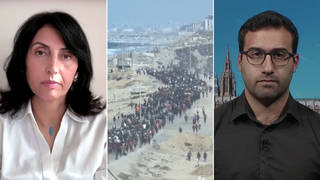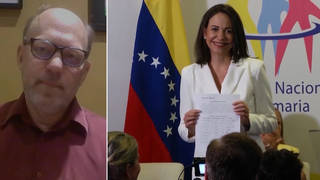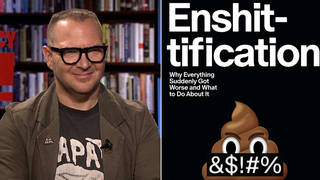
Ryan Matthews, 24, was released from house arrest Monday after a Louisiana court exonerated him of a 1999 murder charge. Matthews was 17 when the 1997 murder of a grocery store owner took place and has served 5 years in prison after being convicted based on questionable eye-witness testimony. We speak with his mother Pauline Matthews and his lawyer Billy Sothern. [includes rush transcript]
A Louisiana court released 24-year-old Ryan Matthews from house arrest on Monday after exonerating him of a 1999 murder charge. Matthews was 17 when the 1997 murder of a grocery store owner took place and has served 5 years in prison. He was convicted based on questionable eye-witness testimony even though his DNA did not match that on a ski mask worn by the murderer and found at the scene. The mask was retested after Matthews’ lawyers heard in 2003 that a convicted murderer, Rondell Love, had bragged to fellow inmates in a Louisiana state prison that he had committed the murder.
Five new DNA tests demonstrated that Matthews had no connection to the murder. Matthews had been under house arrest since April on a $105,000 bond. On Monday, Jefferson Parish District Attorney Paul Connick asked District Court Judge Henry Sullivan to vacate the bond.
Matthews is the 115th death row inmate to be exonerated in the past 25 years and the seventh cleared in Louisiana since 1981 — one of three who had been sentenced to death for crimes allegedly committed while they were juveniles. Last month, the American Bar Association and dozens of other groups, including 48 nations, filed amicus briefs in the U.S. Supreme Court case Roper v. Simmons arguing that juvenile offenders do not have the “heightened moral culpability that the Supreme Court requires for the imposition of the death penalty.” The Supreme Court has not considered the applicability of the death penalty to juveniles for 15 years.
- Pauline Matthews, Mother of Ryan Matthews
- Billy Sothern, Lawyer for Ryan Matthews
- Emily Kunstler, filmmaker, just returned from Louisiana where she filmed Ryan Matthews release.
Transcript
AMY GOODMAN: We’re joined right now by Ryan Matthews’s mother, Pauline Matthews, by his attorney, Billy Sothern, and by Emily Kunstler, who is a filmmaker, has been following the case for the last year-and-a-half. We’ll begin with Pauline Matthews. Your feelings today as your son has been released, at least to house arrest.
PAULINE MATTHEWS: I’m very happy that Ryan is finally free. Because the last seven years has really been hard having my child incarcerated for a crime he clearly did not commit. You know, all the visits to Angola, the phone calls, Ryan’s been away. It’s been a burden, it has really been a burden that I’m glad that we have to hold onto hope that, you know, something would happen. And that the Louisiana Crisis Center and Reprieve and Amnesty and all of the people that’s been there for Ryan, but it’s really good to have Ryan home, and be free.
AMY GOODMAN: So, he is totally free, finished with house arrest?
PAULINE MATTHEWS: He is off house arrest and he’s free. He is able to move about, and everything right now. He was on house arrest for about a month. He’s free right now. It’s really a good feeling to have my child back.
JUAN GONZALEZ: Your sense over these years, as the case developed, and as he remained in prison despite the fact that there was no DNA evidence linking him to the crime. Did you have hope during that period of time that he would eventually be absolved of the crime?
PAULINE MATTHEWS: I really didn’t know whether he would be eventually absolved of the crime, but I always knew that Ryan was innocent. I always believed in my heart that he was innocent. He always said he was innocent. So, you know, we always have to have hope, and you know, I tried my best to have that hope for Ryan because I wasn’t the one locked up. I tried my best to hold my child up and, you know, and — and then let him have that hope that he would eventually be free. And today he is here.
AMY GOODMAN: Billy Sothern, you are Ryan Matthews’s attorney. How did this happen? Why was he fingered? Why was he convicted?
BILLY SOTHERN: Ryan was convicted and sentenced to death for the same reason that a lot of people in America are, because he was poor, because he’s Black and because he didn’t have the kind of power to fight against this sort of awesome power of the state. This case is a case of mistaken identification. It’s a case where DNA evidence was ignored. It’s a case where there was a biased jury and a biased system and it was a case where another young man, Travis Hayes, who is still facing life in prison, made a false confession after being interrogated for hours and hours without attorney, without his parents present. In the end, you know, it seems like very possible that Ryan, if not for this DNA evidence that we found, could have been — could have been executed. Could have really — this case could have gone all the way. So, when I’m looking at the case it just occurs to me it will be a huge mistake if any of us ever viewed Ryan’s case as either an indication that the system works or either as an isolated case. Ryan’s case is a complete and total indictment of the death penalty and the way the system works. And any of us concerned about the process of justice in the United States should be appalled by what happened, and not at all heartened by the fact that this exoneration has occurred.
JUAN GONZALEZ: And of course, Travis Hayes, who was the young man who at first said that he had been involved in the crime is still in prison, isn’t he, and is still serving a prison sentence, and there’s an issue whether he should also be released?
BILLY SOTHERN: Travis Hayes is completely and totally innocent of this crime. The only proof that they ever presented against Travis was that Ryan was the shooter. Now that it’s obvious and manifest that Ryan is completely innocent, there’s absolutely no proof that Travis is guilty. Yet he still sits in Angola Prison facing a life sentence.
AMY GOODMAN: Emily Kunstler, it’s great to have you back. Emily worked on the staff of Democracy Now! from the beginning and has gone on to make independent films. You have been following Ryan’s case for a year-and-a-half. What caught your interest, and you just came back from Louisiana when he was ultimately released?
EMILY KUNSTLER: Well, the reason that we chose to follow Ryan’s case is because it highlighted all of the major problems with the death penalty. The fact that Ryan is Black and impoverished. The fact that he was mentally retarded, the fact that he was a juvenile, and the fact that he was innocent. We felt that drawing attention to this case would raise questions about the death penalty on a larger level.
JUAN GONZALEZ: And how did you learn about his case?
EMILY KUNSTLER: We learned about his case through his attorney, Billy Sothern.
AMY GOODMAN: What was it like when you were just in Louisiana when he was ultimately released?
EMILY KUNSTLER: It was really exciting. It’s been really exciting to be — we felt privileged to have been able to be a part of this process. And to have Ryan eventually released. It’s — you know, it’s not a happy ending, though. It’s — you know, Ryan is coming back, you know, seven years later with, you know, the experience of having been wrongfully accused and what that’s done to him. And still hasn’t received a formal apology from anyone, and there’s no indication that this won’t happen again to anyone. You know.
AMY GOODMAN: Billy Sothern, in fact, the case is not over. Are they going to reopen this case? Could Ryan Matthews be charged again?
BILLY SOTHERN: I think that that is impossible at this point. It’s somewhat discouraging that the district attorney’s office would say this is going to hold the case open, and I can only believe that they’re simply posturing. Ryan and his family are remarkably strong people, and you know, they’re going to put back together the pieces of Ryan’s life and fight on in this case regardless of what anyone does. I think at this point, though, it’s pretty much impossible for the state to bring a case against Ryan simply because there’s overwhelming evidence that he is innocent, and that someone else is guilty. And while I would never be surprised that anything that the prosecutors do, this would even be, I think, beyond reason even for them.
JUAN GONZALEZ: And Billy Sothern, the district attorney who released him, Paul Connick, is this the same district attorney who originally indicted him, or has there been a change there in the office? And also, what kind of impact do you think this is having on Louisiana, the residents of the state in terms of how they view the death penalty?
BILLY SOTHERN: On the first question, Paul Connick is the same district attorney who was in charge of that office in 1997 when Ryan was originally charged. He is also the nephew of Harry Connick, Sr., who is the long-time very corrupt district attorney of New Orleans and the father of the famous Harry Connick, Jr. Regarding how this case has played out in Louisiana, I think that for the large number of people of color, poor people in Louisiana, this case just affirms what they already knew, which is there was no chance of them getting a fair shake in the criminal justice system, and for the people who are conservative who dominate the state politics, I think that this case is just something they can ignore, but we have fought really hard and Ryan and his family have fought really hard to make certain that people can’t ignore this case and that it is really important. I hope that through the resonance of the articles and the press in Louisiana that we can really change things. However, sadly this is the seventh exoneration in Louisiana in six years. So, it really goes to show that something incredibly wrong is happening here with these cases, and that there is simply — there’s simply no safeguards in these most important cases, not only for manifestly innocent people, but for everyone in the system.
AMY GOODMAN: Well, I want to thank you very much for being with us, Billy Sothern, lawyer for Ryan Matthews, Pauline Matthews, Ryan’s mother, and Emily Kunstler who is making a film on Ryan’s case that will be completed soon.










Media Options